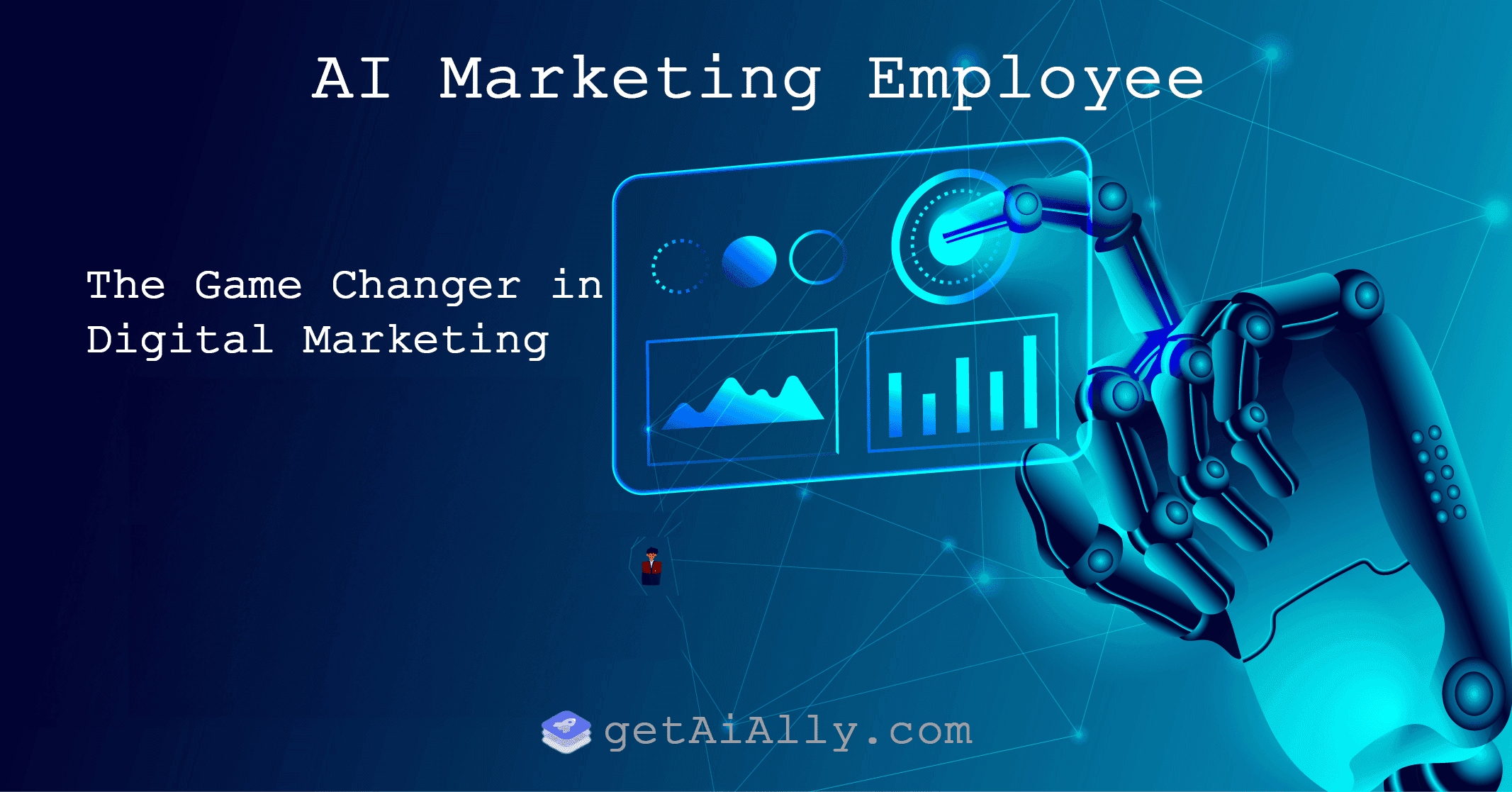Small Teams, Big Impact: Leveraging AI Employees to Boost Startup Growth

Lawrence Liu
8/29/2024

Small Teams, Big Impact: Leveraging AI Employees to Boost Startup Growth
Introduction
In today's rapidly evolving and highly competitive business environment, startups face unprecedented opportunities and challenges. Limited resources, talent shortages, fierce competition, and the need for rapid growth are realities that small teams face every day. However, with the rapid development of artificial intelligence technology, a new solution is quietly changing the rules of the game—AI employees. This article will explore how AI employees can bring huge impact to small teams, and how startups can leverage this technology to achieve rapid growth.
This is the first article in our AI Employee series. View the full series:
- Small Teams, Big Impact: Leveraging AI Employees to Boost Startup Growth (This Article)
- AI Employee ROI: Calculating Real Value for Small Businesses
1. What are AI Employees?
AI employees are virtual assistants or systems created using artificial intelligence technology that can perform a variety of complex tasks, from data analysis to content creation, from customer service to decision support. These digital "employees" don't need rest, can work 24/7, and can quickly learn and adapt to new tasks.
Advantages of AI Employees:
- 24/7 working capability: AI employees can work continuously, without time constraints
- Multi-domain expertise: AI employees can quickly learn and adapt to various tasks
- Cost-effectiveness: In the long run, AI employees may cost less than traditional employees
- Scalability: AI employees can be quickly scaled up or down according to demand
For startups, the emergence of AI employees is undoubtedly a game-changer. They not only can fill the skill gaps of small teams but also greatly improve work efficiency while reducing operating costs. Imagine a team of just a few people, yet having a marketing department, customer service center, and data analysis team working around the clock—this is the change that AI employees can bring.
2. Applications of AI Employees in Startups
2.1 Marketing and Sales
AI can help analyze market trends, formulate marketing strategies, and even generate targeted advertising content. For example, an entrepreneur shared how he relied entirely on AI employees to develop marketing plans and implement strategies, greatly improving marketing efficiency. Specific tasks include:
- Market research and competitive analysis
- Content creation (blog posts, social media posts, etc.)
- Personalized marketing strategy formulation
- 24/7 customer service support
2.2 Product Development
AI can assist in market research, user needs analysis, and even participate in the product design process. Some entrepreneurs have used AI technology stacks to complete the entire app development process from design to launch in a very short time. AI applications in product development include:
- User needs analysis
- Prototype design
- Code generation
- User experience optimization
2.3 Customer Service
AI-driven chatbots can handle customer inquiries 24 hours a day, providing instant responses and greatly improving customer satisfaction. This not only enhances the customer experience but also significantly reduces customer service costs.
2.4 Data Analysis and Decision Support
AI can quickly process and analyze large amounts of data, providing strong support for decision-making. For example, an insurtech startup used AI technology to improve insurance sales efficiency, increasing sales performance by 20% to 30%. AI applications in this area include:
- Market trend prediction
- Customer behavior analysis
- Financial forecasting and risk assessment
- Business process optimization suggestions
3. Case Studies: AI Employees Helping Startups Succeed
3.1 One-Person Company's AI Marketing Team
Some entrepreneurs shared that they rely entirely on AI employees to execute marketing plans, from market research, strategy formulation to content creation and effect analysis, greatly reducing marketing costs while improving efficiency.
Results: Significantly reduced marketing costs and improved efficiency
3.2 AI Solutions in the Fashion Industry
A startup used AI technology to solve the fragmented inventory problem in the fashion industry. By using AI to generate detailed product pages with models, they reduced the cost from "several thousand dollars" to "a few seconds", making online sales of small batch inventories possible.
Results: Reduced the cost from "several thousand dollars" to "a few seconds"
3.3 Lianjia: AI Solves Large-Scale Training Challenges
Lianjia, a leading real estate brokerage company in China, faced the enormous challenge of training 120,000 agents. Traditional training methods were costly, inefficient, and difficult to evaluate. Lianjia achieved the following breakthroughs by introducing AI employees:
Implementation:
- AI simulated scenario training: Providing simulated scenarios of various customer types and housing needs for new agents
- AI real-time scoring feedback: Analyzing agents' performance in simulated scenarios, providing scores and improvement suggestions
- AI personalized training plans: Recommending personalized training content based on each agent's learning progress and weak areas
Results: Significantly improved training efficiency and effectiveness while greatly reducing training costs
3.4 Nuanwa Technology: AI Improves Insurance Sales Efficiency
Nuanwa Technology, an internet insurance brokerage company, used AI technology to solve the problem of sales personnel facing too many opportunities and limited energy. Their AI solution includes:
Implementation:
- AI screening and allocation of opportunities: Prioritizing sales opportunities based on customer information, interaction history, etc.
- AI personalized communication: Generating personalized communication content, such as birthday greetings, product recommendations, etc.
Results: Sales performance increased by 20% to 30%
4. Challenges and Solutions in Implementing AI Employees
Although AI employees bring many advantages, there are also some challenges in the implementation process:
4.1 Technology Integration
Integrating AI systems with existing workflows and systems can be challenging.
Solution: Adopt modular AI tools, integrate gradually, and adjust workflows in a timely manner.
4.2 Data Security and Privacy
AI systems need to process large amounts of data, and ensuring data security and user privacy is an important issue.
Solution: Startups need to establish strict data protection mechanisms and choose AI solutions with security guarantees.
4.3 Output Format Diversity
Some entrepreneurs reported that AI output is difficult to match the media and formats required for various actual work.
Solutions:
- Use specialized format conversion tools
- Choose AI tools with multi-format output capabilities
- Develop custom interfaces for AI to output directly to specific systems or databases
- Train personnel for necessary post-processing and format adjustments
4.4 Resistance from Team Members
Introducing AI employees may cause concerns among team members.
Strategies:
- Enhance communication, explain AI's auxiliary role: Emphasize that AI is to augment rather than replace human employees
- Demonstrate how AI improves work efficiency: Use specific examples to show how AI makes work easier and more effective
4.5 Technology Integration and Learning Curve
The introduction of new technology is always accompanied by a learning process.
Solutions:
- Provide comprehensive training support: Provide necessary training for employees to ensure they can proficiently use new AI tools
- Implement gradually, starting with small-scale pilots: Test and refine in a small scope first, then promote comprehensively
5. How to Start Using AI Employees
For startups wanting to start using AI employees, here are some suggestions:
5.1 Assess Company Needs
- Clarify which areas need AI support the most
- Identify current efficiency bottlenecks: Review your business processes to find time-consuming and repetitive tasks
- Determine repetitive tasks that can be handled by AI: List work that can be automated, such as data entry, report generation, etc.
- Evaluate potential return on investment: Calculate the cost savings and efficiency improvements that introducing AI employees might bring
5.2 Choose Suitable AI Solutions
- Research existing AI tools and platforms in the market: Understand the features and advantages offered by different vendors
- Consider the possibility of customized solutions: Assess whether you need to develop custom AI systems for your specific needs
- Evaluate compatibility with existing systems: Ensure that new AI systems can seamlessly integrate with your existing technology stack
- Start with small-scale pilots and gradually expand the application scope
5.3 Develop an Implementation Plan
- Set clear goals and timelines: Determine short-term and long-term goals, develop a phased implementation plan
- Allocate resources for AI integration: Determine the financial and human resources required
- Develop employee training plans: Ensure team members can effectively use new AI tools
- Continuous optimization and upgrading: Continuously adjust and optimize AI systems based on actual usage effects
6. Future Outlook for AI Employees
Looking ahead, the role of AI employees in the startup ecosystem will become increasingly important. As one entrepreneur predicted,
"Humans as the final decision-makers, AI as researchers, designers, implementers, doing the vast majority of actual work. From marketing to building, sales, customer service, etc., AI will be the main player in between."
"One-person company/small team + AI" is likely to become the standard model for future startups. In this model, entrepreneurs can use AI to expand their capabilities and manage more complex businesses without the need for large human resource investments. This model will bring the following changes:
- Lower entry barriers for startups: Individuals or small teams can obtain enterprise-level capabilities and efficiency through AI employees
- Improve competitiveness: Small companies can achieve productivity and innovation capabilities comparable to large companies through AI
- Resource optimization: Founders can focus on core business and strategic decisions, delegating daily operations to AI
Future Human-Machine Collaboration Model:
- Humans as final decision-makers: Founders and core teams focus on strategy formulation, innovative thinking, and key decisions
- AI as all-round assistants: From research and design to implementation, AI will undertake the vast majority of actual work
- Full-process AI support: AI will play a key role throughout the business process, from marketing, product building to sales and customer service
7. Frequently Asked Questions
Q1: Will AI employees completely replace human employees? A1: No. The purpose of AI employees is to augment rather than replace human employees, establishing an effective human-machine collaboration model.
Q2: How can small companies afford the cost of AI employees? A2: Many AI tools offer flexible pricing models, allowing small companies to start small and gradually expand usage as their business grows.
Q3: How to ensure the output quality of AI employees? A3: Through continuous supervision and feedback, combined with the professional judgment of human employees, the quality of AI output can be continuously improved.
Article Series
If you want to learn more about the return on investment of AI employees, please check out our next article:
Conclusion
AI employees are bringing unprecedented opportunities to startups, reshaping the startup ecosystem. By reasonably utilizing AI technology, small teams can achieve big impacts and stand out in the competitive market. Although there may be challenges in the implementation process, AI employees will become a powerful aid to startups, helping them achieve rapid growth and sustainable development, as long as the right strategies are adopted.
In this AI era, entrepreneurs who dare to embrace new technologies and are good at leveraging AI employees will have a head start in future business competition. Future successful entrepreneurs will be those who can effectively integrate human creativity and AI efficiency. Let's embrace this revolution and let AI employees give wings to our entrepreneurial dreams! Now is the best time to embrace this revolutionary technology, let's explore the endless possibilities brought by AI employees together!
Early Access Offer
Now, you have the opportunity to secure a super value offer for our AI employee system.
Pre-order now for just $19.9, and you'll get a permanent 50% discount on the subscription price when the system officially launches.
Pre-order now to lock in the offer
Don't miss this opportunity to participate in the AI-driven efficiency revolution. Join us in exploring how AI can change the way we work!
Join Our Community
We cordially invite you to join our early adopter community. Here, you can:
- Exchange ideas with other cutting-edge technology enthusiasts and innovators
- Get the latest updates on the development of the AI employee system
- Directly influence the direction of system feature development
- Participate in exclusive beta testing and feedback activities
Join the community and become part of shaping the AI-driven future of work! Let's work together to create a new work environment and drive innovation and development for small businesses and individual developers.
Related Posts

AI-Driven Personalized Marketing: Redefining the New Paradigm of Customer Experience
Dive deep into how AI marketing employees are revolutionizing personalized marketing strategies. From precise customer profile construction to dynamic content generation, understand how AI creates unprecedented personalized customer experiences.

AI Marketing Employee: A New Paradigm for Data-Driven Decision Making
Explore how AI marketing employees are revolutionizing data processing and analysis. Learn how this groundbreaking technology provides real-time insights, optimizes decision-making processes, and drives precision in marketing strategies.

AI Marketing Employee: The Game Changer in Digital Marketing
Explore how AI marketing employees are revolutionizing the digital marketing landscape. Learn how this groundbreaking technology enhances efficiency, precision, and creates unprecedented value for brands.